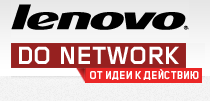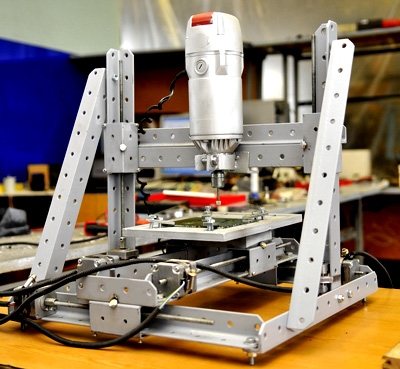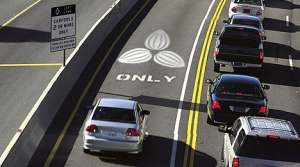Winner Lenovo Do Network will develop a personal 3D printer
 As you probably noticed, recently a new educational project by Lenovo called Do Network has been actively advertised on Habré . Over the past three months, we have selected applicants for a grant of $ 25,000 among the authors of the most interesting technical projects. Today we are ready to announce the winner: it was a team project led by Roman Zhukov, which involves the development of a relatively inexpensive personal 3D printer .
As you probably noticed, recently a new educational project by Lenovo called Do Network has been actively advertised on Habré . Over the past three months, we have selected applicants for a grant of $ 25,000 among the authors of the most interesting technical projects. Today we are ready to announce the winner: it was a team project led by Roman Zhukov, which involves the development of a relatively inexpensive personal 3D printer . The participants of the Do Network contest needed not only to present an interesting idea for development, but also to fulfill a number of requirements - to attract an audience, develop the necessary documentation and assemble a team that could subsequently begin to implement the project. By the rulesof the competition, of all the applications submitted at the beginning of this year, we, together with mentors - invited experts - selected ten finalists. The winner of the top ten projects was determined by popular vote.
 So, the winner was the project of a personal 3D printer. The authors of the project do not intend to copy the existing developments, and the main criteria for the future device are a reasonable price in comparison with existing commercial designs (up to $ 1,500 for a finished printer), as well as the use of domestic supplies. It will be possible to service such a device at home - it is planned to develop replaceable cartridges with material from which the printer can create three-dimensional models. In other words, such a device will not be any different from a regular home printer - connected to a computer, installed a cartridge and you can work. Congratulations to Roman and his team on their victory! We believe that you will succeed.
So, the winner was the project of a personal 3D printer. The authors of the project do not intend to copy the existing developments, and the main criteria for the future device are a reasonable price in comparison with existing commercial designs (up to $ 1,500 for a finished printer), as well as the use of domestic supplies. It will be possible to service such a device at home - it is planned to develop replaceable cartridges with material from which the printer can create three-dimensional models. In other words, such a device will not be any different from a regular home printer - connected to a computer, installed a cartridge and you can work. Congratulations to Roman and his team on their victory! We believe that you will succeed.  The top ten finalists also presented interesting projects such as Home Laboratory". Within the framework of this project, it is planned to create a whole complex of a computer, controller, and CNC machine to create our own research laboratory at home. It is noteworthy that all the hardware components proposed for this project are already being produced in Russia. The authors propose only to create on their basis an end product that includes hardware, software, and even a knowledge base (based on the Wikipedia engine) that can become the basis for experiments.
The top ten finalists also presented interesting projects such as Home Laboratory". Within the framework of this project, it is planned to create a whole complex of a computer, controller, and CNC machine to create our own research laboratory at home. It is noteworthy that all the hardware components proposed for this project are already being produced in Russia. The authors propose only to create on their basis an end product that includes hardware, software, and even a knowledge base (based on the Wikipedia engine) that can become the basis for experiments. My personal favorite is the AR-Go project , developed by a team led by Yana Artishcheva. Yana herself spoke more about him on Habré - here in thisthe material. The advantage of this project, of course, is the availability of a working prototype of a wearable computer and the design of an augmented reality system. One of the most interesting Do Network participating projects can become quite commonplace over time - just supplement a regular smartphone with a compact head-mounted display and control system. However, this sounds simple only in words, although in fact it is supposed to completely redo the very approach to "communication" with mobile computer devices. This is a good project for Yana. Good luck!
 Service " Plantain”Proposes to adopt the experience of residents of other countries in Russia to reduce traffic congestion and save on gasoline. If your housemate goes to work in the same area as you, then you will be able to team up and drive in the same car (in turn). If you can find another 1-2 people, then the savings are decent. To implement the principle of carpool, which is very popular in the USA, in accordance with modern realities, it is proposed to create an application for mobile devices (for Android and iOS) in which you indicate your route and look for colleagues in your area.
Service " Plantain”Proposes to adopt the experience of residents of other countries in Russia to reduce traffic congestion and save on gasoline. If your housemate goes to work in the same area as you, then you will be able to team up and drive in the same car (in turn). If you can find another 1-2 people, then the savings are decent. To implement the principle of carpool, which is very popular in the USA, in accordance with modern realities, it is proposed to create an application for mobile devices (for Android and iOS) in which you indicate your route and look for colleagues in your area. Ten final projects of the Do Network contest will receive Lenovo computers as prizes - those models that were indicated on the project page as necessary devices for further work. All finalists of the competition can be viewed atthis page.
Along with the Russian competition, similar projects were implemented by us in two other countries - India and Indonesia. There are also very interesting developments, for example, the Indian project of a peer-to-peer communication network between cars on the roads, which also provides for interaction with traffic lights for more competent traffic management.
Once again, congratulations to the winners and finalists of the contest. The project turned out to be very interesting and useful for us at Lenovo, and we are pleased to announce that it will be continued in the future, but with new topics for project assignments.
